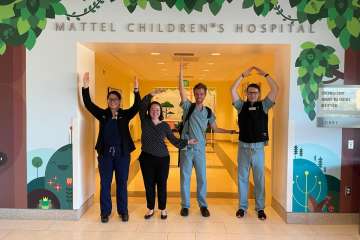Pediatric Critical Care Fellowship
The UCLA Division of Pediatric Critical Care was established in 1982 and the first fellows entered the training program in 1986. Our fellowship program, which was among the first to achieve ACGME accreditation in 1990, offers outstanding clinical training in every aspect of Pediatric Critical Care with a high level of mentorship and extensive research opportunities. It is designed to provide the knowledge, procedural skills and attitudes necessary to provide excellent care in a variety of emergent and intensive care settings.
The strength of our program is a diverse faculty with a variety of interests and backgrounds who are passionate about the practice of Pediatric Critical Care and are dedicated to the education of fellows in training. We are fortunate to interface with leaders in the field of all the other pediatric subspecialties and continuously learn from their experience.
Our Vision:
We envision that our graduates will positively impact the health of critically ill children through their leadership, research contributions and excellence in patient care.
Our Missions:
- Patient Care: We strive to improve the standard of practice and ensure the highest quality of care to children in our hospital. We care for children with the highest respect for their lives in a family-centered, compassionate and caring environment, utilizing evidence-based approaches to treatments as well as incorporating innovative, cutting edge ideas to solve clinical problems.
- Research: We aim to pursue new knowledge through high quality research that explores unanswered questions and challenges and refines previously established ideas on mechanisms of disease and clinical aspects of pediatric critical care. We engage in clinical, translational and basic science research aimed at improving children's lives throughout their life-span. We also work collaboratively within and outside our institution in order to generate important discoveries that enhance medical practice and inform the medical community and the public of evidence-based approaches to pediatric critical care medicine.
- Education: Our goal is to impart knowledge, instill excitement for learning, and translate and refine questions into focused areas of research. We train future leaders in pediatric critical care medicine who work in an academic or private setting and deliver the highest quality care to their patients. We accomplish this by:
- Allowing fellows to pursue their interests in a structured manner in order to produce quality research addressing significant questions in pediatric critical care medicine and providing an individualized approach for each fellow.
- Promoting a collegial environment that provides ample opportunity for fellows to grow and learn from their own and others' experiences.


Our goals for each trainee:
- Develop expertise in the complex care of all critically ill children and develop a particular interest and subspecialty within critical care, if desired.
- Develop technical skills for all procedures necessary in the field of pediatric critical care medicine.
- Develop knowledge on physiology and evidenced-based approaches to therapy.
- Develop skills in the design, understanding and performance of clinical and/or laboratory research that will result in a better comprehension of mechanisms of disease, physiology and pathology and the completion of at least one mentored research or scholarship project under the supervision of a scholarship oversight committee.
- Develop expertise at organization, analysis, preparation, and presentation of data.
- Be prepared for a successful academic or clinical career and provide the skills to incorporate successful research into a clinically demanding specialty.
- Fulfill all the requirements to obtain certification in Pediatric Critical Care Medicine by the American Board of Pediatrics; develop the self-discipline required for life-long learning, maintenance of certification and develop the expertise, administrative skills and insight required for career planning, adaptation, leadership and excellence in patient care.
- Develop the emotional and professional skills to work in a demanding environment while maintaining work-life balance.